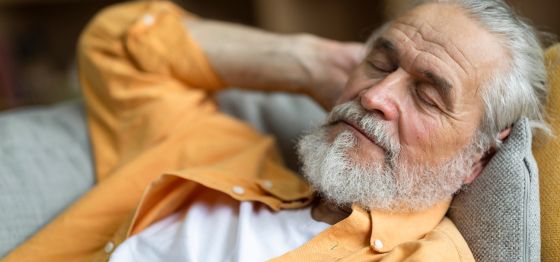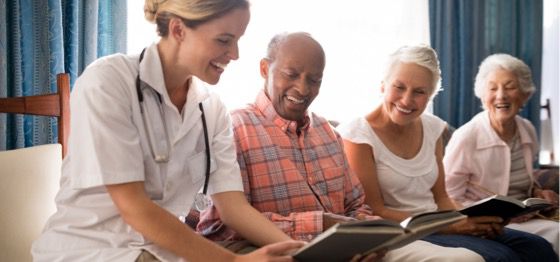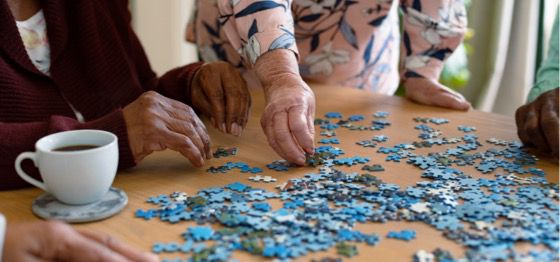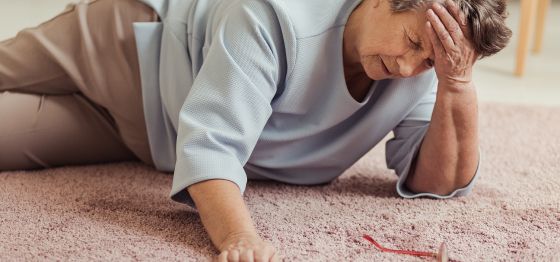When an older adult feels excessively sleepy during the day, it could be caused by different factors including problems with sleeping well at night, various health issues, mood disorders or side effects of medication.1 This sleepiness can lead to problems with thinking and memory and could be a sign of a bigger problem like dementia.2 Because it’s so important to treat or eliminate the cause of excessive sleepiness in seniors, doctors will look at all the different aspects of the disorder as they formulate a plan to fix it.3
6 causes of excessive sleepiness in older adults
It’s not uncommon for older adults to get tired more easily as they age, but suddenly lacking the energy to stay awake during the day could be a sign of a more serious health concern that’s causing such fatigue.4
“There are many causes of fatigue that can range from benign to severe and can have sudden onset,” says David Cutler, M.D., family medicine physician at Providence Saint John’s Health Center in Santa Monica, California. “While it is normal to experience some fatigue each day, a noticeable change in energy or wakefulness that persists despite taking steps towards rest and self-care may warrant further medical investigation.”5
Here are 6 common causes of excessive sleepiness in older adults:
- Medications
As people age, their body’s metabolism and fat concentration changes, making older adults more vulnerable to side effects of certain medications.6 Fatigue is a common side effect of many over-the-counter and prescription drugs, including antidepressants, antihistamines, sleep aids, anti-nausea meds, opioids, muscle relaxants and alpha and beta blockers.7
- Medical treatments or surgical recovery
Medical treatments like chemotherapy or radiation can leave seniors feeling drained and worn out.8 Older adults may also feel more tired than usual when they’re recovering from surgery or a medical procedure, according to Ankur Patel, M.D., a geriatrician based in Richmond, Virginia. In addition to the body expending energy on healing, the patient may be given new medications post-surgery that could cause side effects like fatigue.9
- Infections
Illnesses like the flu, pneumonia and urinary tract infections can make older adults tired, as their body expends extra energy to fight off the germs. In some cases, these problems can go undiagnosed, because older adults often have vague symptoms, and may not talk to their caregiver or doctors.10
- Anxiety or depression
Strong emotions can sometimes appear as physical symptoms like sudden extreme fatigue, while feelings of depression can become more common with age.11 “Older adults may experience loneliness, grief or anxiety about the future, which often goes undiagnosed and may result in fatigue,” Dr. Cutler says.12
- Nutrient deficiencies
Low levels of iron, for example, which can occur when older adults have iron-deficiency anemia, can leave them feeling weak and sluggish.13 Nutrient deficiencies can cause fatigue in people of all ages, but seniors are more at risk of not getting the nutrients they require.14
- Sleep apnea
Older adults are at higher risk for this condition, which can disrupt breathing while they’re sleeping, causing them to wake many times throughout the night without realizing it. This may lead to excessive daytime sleepiness, even after a full night’s sleep.15
What are some risks of excessive sleepiness in older adults?
Sleeping too much may be just as damaging as sleeping too little, putting senior adults at risk for several health conditions,16 including:
- Heart disease. Sleeping too much may increase a person’s risk of heart disease, the number one cause of death in the United States.17
- Obesity. Research has shown that people who sleep too much tend to weigh more due to lack of movement and slower burning of calories.18
- Difficulty concentrating. According to research reported in the Journal of the American Geriatrics Society, excessive sleeping may accelerate brain aging, which makes it increasingly difficult to perform simple daily tasks.19
- Depression. Depression and sleep appear to be interrelated in that depression may make a person sleep longer. Consequently, sleeping longer can increase the person’s depressed state.20
How to prevent excessive sleep in seniors21
Preventing excessive sleepiness during the day is dependent on getting a good night’s sleep. Here are several suggestions for older adults to consider:
- Follow a regular sleep schedule
Go to bed and get up at the same times each day, even on weekends or when traveling.
- Avoid napping in the afternoon or evening
Naps later in the day may affect the ability of seniors to get to sleep at night.
- Minimize TV, computer, cellphone or tablet use in the bedroom
The light from these devices may make it hard to unwind and fall asleep.
- Use low lighting in the evenings
The less bright light the better, especially when preparing for bed.
- Exercise at regular times daily
Get plenty of exercise on a regular schedule, but not within 3 hours of going to bed.
- Avoid eating large meals close to bedtime
A full stomach and the body’s hard work to digest it may prevent falling asleep.
- Stay away from caffeine late in the day
Coffee, tea, soft drinks and chocolate all contain caffeine. Avoid them at night.
Go365 by Humana® makes wellness fun and easy. We help Humana Medicare members with Go365® on their plan reach health goals, as well as take care of their physical and emotional health—allowing members to thrive at any age.
Humana Medicare members with Go365 on their plan can enroll in Go365 at
Go365 is a well-being and rewards program for many Humana Medicare Advantage members. Rewards have no cash value and can only be redeemed in the Go365 Mall. Rewards must be earned and redeemed within the same plan year. Any rewards not redeemed by December 31st will be forfeited.
If you need to enroll in Medicare Advantage or change your plan outside of the usual Medicare Annual Election Period, a Special Election Period (SEP) could be the answer. For information on eligibility, visit Humana’s
To learn more about Humana Medicare Advantage, call to speak with a licensed Humana sales agent at 1-844-321-5843 (TTY:711), Monday – Friday, 8 a.m. – 8 p.m. local time or visit
Sources:
1Dora Zalai, et. al. “Sleepiness in the Elderly,” National Library of Medicine, last accessed April 11, 2023,
2“Sleepiness in the Elderly.”
3“Sleepiness in the Elderly.”
4Marygrace Taylor, “7 Reasons for Sudden Extreme Sleepiness as You Age,” Livestrong.com, last accessed April 11, 2023,
5Taylor, “7 Reasons for Sudden Extreme Sleepiness as You Age.”
6Taylor, “7 Reasons for Sudden Extreme Sleepiness as You Age.”
7“What to do when medication makes you sleepy,” Harvard Medical School, last accessed April 11, 2023,
8“Fatigue in Older Adults,” National Institute on Aging, last accessed April 11, 2023,
9Taylor, “7 Reasons for Sudden Extreme Sleepiness as You Age.”
10Taylor, “7 Reasons for Sudden Extreme Sleepiness as You Age.”
11“Fatigue in Older Adults.”
12Taylor, “7 Reasons for Sudden Extreme Sleepiness as You Age.”
13“Anemia,” Mayo Clinic, last accessed April 11, 2023,
14Christine Ritchie, MD, et. al., “Geriatric nutrition: Nutritional issues in older adults,” last accessed April 11, 2023,
15“Always tired? You May Have Sleep Apnea,” U.S. Food & Drug Administration, last accessed April 11, 2023,
16Rebecca Levi, “Oversleeping,” The Sleep Doctor, last accessed April 11, 2023,
17“Heart Disease Facts,” Centers for Disease Control and Prevention, last accessed April 11, 2023,
18Jean-Phillipe Chaput, et. al., “Seven to Eight Hours of Sleep a Night,” PLOS ONE, last accessed April 11, 2023,
19Elizabeth E. Devore, ScD, et. al., “Sleep Duration in Midlife and Later Life,” Journal of the American Geriatric Society, last accessed April 11, 2023,
20Lana Barhum, “Does Sleeping Too Much Affect You?” Verywellhealth.com, last accessed April 11, 2023,
21“A Good Night’s Sleep,” National Institute on Aging, last accessed April 11, 2023,
Consult your doctor before beginning any new diet or exercise regimen.
This information is provided for educational purposes only. It is not to be used for medical advice, diagnosis or treatment. Consult your healthcare provider if you have questions or concerns.
Humana is a Medicare Advantage HMO, PPO and PFFS organization with a Medicare contract. Humana is also a Coordinated Care plan with a Medicare contract and a contract with the state Medicaid program. Enrollment in any Humana plan depends on contract renewal.





